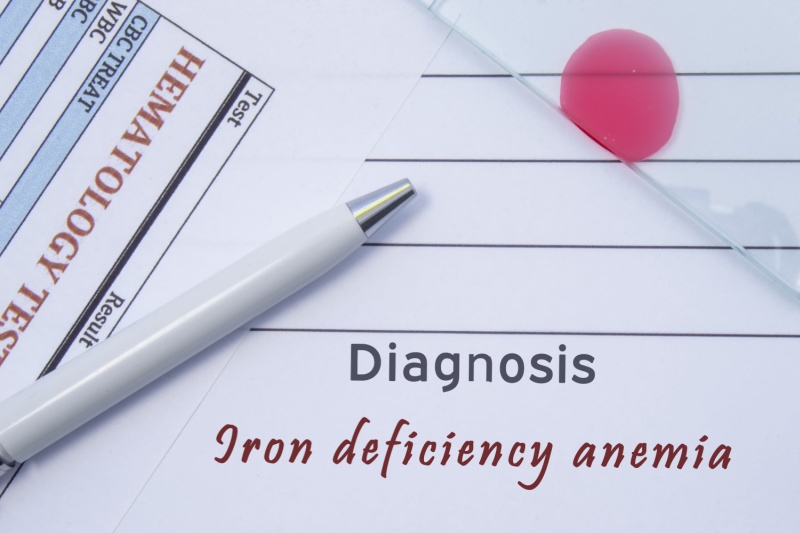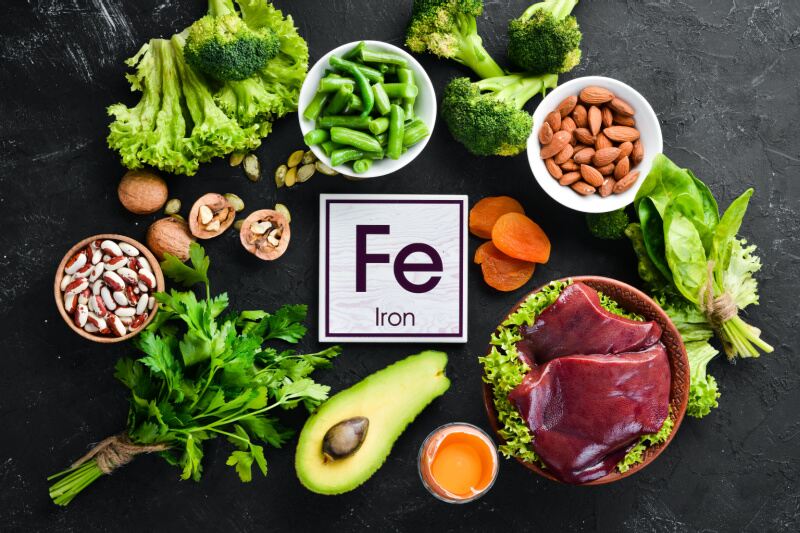Anemia is a health condition where your blood lacks healthy red blood cells (RBCs). Iron deficiency anemia is a common type of anemia that occurs when your body lacks enough iron to make RBCs. This condition is generally prevalent in people with a low-iron diet.
What you need to know:
- What is iron deficiency anemia?
- Signs and symptoms of iron deficiency anemia
- Causes of iron deficiency
- Treating iron deficiency anemia
What is iron-deficiency anemia?
 Iron deficiency occurs when your body does not have enough iron to produce hemoglobin, a substance in the RBCs responsible for carrying oxygen throughout your body. Therefore, you might feel short of breath and exhausted. Iron also plays a vital role in certain body functions, such as the development of brain function. Iron is also required for maintaining healthy skin, hair and nails.
Iron deficiency occurs when your body does not have enough iron to produce hemoglobin, a substance in the RBCs responsible for carrying oxygen throughout your body. Therefore, you might feel short of breath and exhausted. Iron also plays a vital role in certain body functions, such as the development of brain function. Iron is also required for maintaining healthy skin, hair and nails.
Signs and symptoms of iron deficiency anemia
Here are some common iron deficiency anemia symptoms:
- Fatigue and weakness
- Paleness in skin
- Shortness of breath
- Chest pain
- Cold hands and feet
Causes of iron deficiency
Here are some health conditions that can increase the risk of iron deficiency:
- Blood loss: Loss of blood causes loss of iron. It can happen in several ways, including:
- Bleeding in your gastrointestinal tract from inflammatory bowel disease, ulcer or other GI disorders such as celiac disease.
- Traumatic injuries or surgeries.
- Heavy menstrual flow.
- Bleeding during childbirth.
- Regular use of aspirin or nonsteroidal anti-inflammatory drugs such as ibuprofen and naproxen.
- Bleeding in the urinary tract.
- Problems absorbing iron: Certain health conditions can impact your body’s ability to absorb and utilize iron. These conditions are:
- Genetic conditions like celiac disease.
- Digestive problems such as ulcerative colitis, Crohn’s disease and helicobacter pylori infection.
- Stomach and intestinal surgeries like weight loss surgery.
- Other medical conditions: Other medical conditions that can cause iron-deficiency anemia include:
- Kidney disease: People with this condition cannot produce erythropoietin, a hormone vital for making RBCs.
- Inflammatory conditions: Health conditions like congestive health failure and obesity can make it hard for your body to utilize iron properly.
Treating iron deficiency anemia

Here are some common treatment options for managing iron deficiency anemia:
Iron-rich diet
Eat a healthy diet with good iron and vitamin C sources. Good iron sources include beans, dried fruits, lean red meat, salmon, iron-fortified bread, cereals and dark green leafy veggies.
It is also always a good idea to help the body regulate your iron levels by maintaining a healthy diet with good sources of iron and vitamin C.
Good sources of iron include beans, dried fruits, eggs, lean red meat, salmon, iron-fortified pieces of bread, cereals, peas, tofu, and dark green leafy vegetables.
Vitamin-C-rich foods include oranges, strawberries, and tomatoes. These food items can help your body absorb iron.
Iron supplements
Also known as oral iron, iron supplements can increase the iron content in your blood. The complete course of iron supplements for anemia takes around 3-6 months to restore your body’s iron levels. Talk to your doctor if you experience side effects like the metallic taste, vomiting, diarrhea, and constipation.
Medical treatments
Medicines such as erythropoiesis-stimulating agents (ESA) can help your bone marrow to create more RBCs. These medicines are typically used in iron therapy.
Besides following the lifestyle changes mentioned above, consider staying physically active and practising yoga and exercises to live fully. Visit your doctor if you feel sick or uncomfortable at any point in time.
Stay tuned to the Activ Living Community. Keep up to date with the latest health tips and trends through expert videos, podcasts, articles, and much more in nutrition, fitness, mindfulness, and lifestyle conditions like Asthma, Blood Pressure, Cholesterol, and Diabetes. Activ Living ke saath sahi sehat ki shuruaat ABHIkaro.
You may also be interested in the following blogs:
- Yoga Asanas To Gain Control Over Your Blood Sugar Levels
- Impact Of High & Low Blood Sugar Levels On Your Body
Popular Searches
How to lower blood pressure | Fruits good for liver | Unhealthy foods | Ragi Benefits | Basal Metabolic Rate | Acupressure points for High Blood Pressure | Ayurvedic medicine for blood pressure | How to control cholesterol at home | Homeopathy for Asthma | Biological Age | Home remedies for TB | Natural beta blockers | Negative effects of internet | Types of walking | Blood pressure calculator | Blood sugar calculator | BMI Calculator





 1800-270-7000
1800-270-7000





